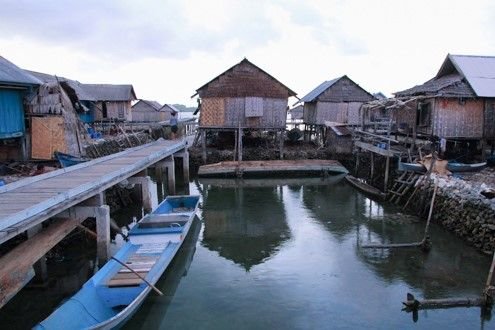my home town Kampung Bajo Sampela, a village life story above the reef.

The bridges that stand on the pile which in some parts has been shaped like a concrete bridge the community kinship here. Down and down the little kids running around with their peers. The little boats seemed to be moored regularly in small canals that were actually sea. The "Apo" arrangement or the rocks that form the foundation of their yard look solid. It was a very modest evening in a village standing in the sea of kaledupa, the village of Bajo Sama Bahari.
It used to be called Kampung bajo Sampela village. But now this village changed its name to Sama bahari. This bajo tribe village is located not far from the mainland Kaledupa, Wakatobi. I use a small robin-engined boat that takes about 15-20 minutes from the Kaledupa mainland. And a small pier welcomes me as I enter this marine village of Sama.
Little boisterous kids gathered at the dock when I arrived. They look very enthusiastic with the immigrants. My step was directed to a house of the father of the village head of Sama Bahari village. After meeting and expressing the purpose of arrival, I went back down the path that is actually a small bridge that stood on the sea.
These bridges seem to be a link between the families in the village. But I also found some homes that have not been connected with this tiny bridge. If you have this story, a small boat is their means of transportation. With that little boat they do everything. From taking water to the ground, shopping, fishing, or just visiting relatives.
The origin of the existence of the Bajo tribe is still confusing. Some argue that this tribe was once a migrant from the South China Sea, but there is also a version explaining that this Bajo tribe is a follower of King Sameng in Johor who is looking for a princess who was married to a prince of bugis and settled in Sulawesi. From whence the origin of this tribe is very unique. In fact they got the nickname of the sea Gipsy.
Once these bajo tribes were known as boatmen, as they lived on boats. But over the times Tribe has started to recognize technology and settled life, although not far from the sea, even still in the middle of the sea. The reason why they are never far from the sea is because the sea is their field. They used to earn a living and live their lives at sea. The fish they catch in the traditional way in the middle of the sea are usually sold to Wanci mainland, but usually there are boats steaming fish catches in this village, so they do not have to go all the way to Wanci.
This tribe believes in "Umbo Mandilao" or the sea guard. They used to call this sea-guard with an ancestor living in the sea. They always believe that Umbo Madilao is always adding fish in the sea so as not to run out even though every day they catch. And they also believe that the sea guard is the one who always keep their life at sea anytime.
Labuka, this Sama Bahari village youth took me to his house. The fish that cultivate that night around the village we will burn in the yard of his house. Kampung darkness that night. But I am grateful with the darkness of the village I can see thousands of stars scattered in the sky right above this village. While making my fire tingle with the dark conditions of the village, what is this? Has not electricity reached this little village yet?
It turns out the questions in my heart in Labuka answer with deep inner tone. "Maybe the genset is damaged bang, or no one paid to buy oil for generator" a sentence slid from the mouth of my new best friend. And it turns out to turn on the generator they have to pay two thousand rupiah per house per night. Heiii to two thousand silver really means for information here, where is the conscience of our officials in the city of Jakarta Far away there, to the extent that they do not see the life of a village far from the glittering city full of facilities.
Fresh sea fish ready for us to burn. Meanwhile Labuka brought a bowl of saltwater as a natural spice for the fish to be burned. 2 cassowary shapes that are formed like a small cone are also ready to accompany. Kasuami is processed food from cassava that is grated and cooked. Approximately thousands of stars, above the village in the middle of the sea I eat fresh grilled fish and casuami are delicious, Labuka entertain me with a regional song that he sang. I do not know the meaning of the song, but what I capture from the outgoing tones is the bitterness experienced by the Bajo tribe, the village where Labuka was born and lived. The village has not been touched by the uneven development in the country. Ah well, this Sama Bahari Village teaches me about a way of meaningful life in a simple way.
Good info and nice pictur @kahlom